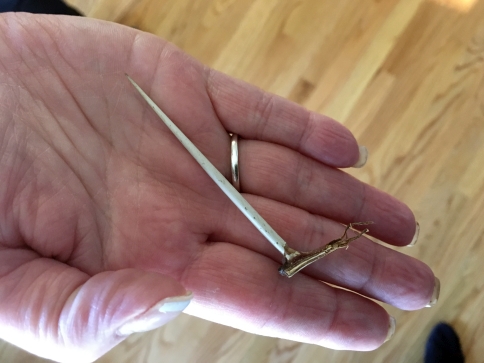| Always Forgive You
|
|
| Thursday, May 02, 2019 | |
She was just seven years old. But Lynnette had clearly crossed a line. It was an offense that called for an apology. I went to her room wanting to teach her that an apology is more than a quickly mumbled, “Sorry.” It means naming your offense, acknowledge that it was wrong, and then asking for forgiveness. With a bit of prompting, Lynnette came through with a very nice apology. As she uttered the words, “Will you forgive me?” I looked her squarely in the eyes (I was down on one knee). I said, “Of course I forgive you. I’ll always forgive you, Lynnette.” But just two weeks later, the offense was mine, and Diana let me know it was my turn to apologize to our daughter. I found Lynnette in her bedroom. Having named my offense and apologized for hurting her, I then asked, “Will you please forgive me?” As I look back, I’m not sure what I expected. Maybe a mumbled, “okay” or something like that. Lynnette replied sweetly and without hesitation, “Of course I forgive you. I’ll always forgive you, Daddy.” It was almost as if a recorder was playing back my exact words from two weeks prior. Not one teeny smidge of hesitation in her voice. There was only kindness and generosity. Does this sound familiar? Can you think of someone else who freely assures His children, “Of course I’ll forgive you. I’ll always forgive you”?
1 John 1:9 is such a familiar verse that it may well have become mundane to some of us. Hear it again: “If we confess our sins (agree with God, admit our wrong), he is faithful (utterly reliable and 100 percent dependable) and just (the wrong we’ve done is paid for by Jesus Himself to meet the requirements of a holy God) to forgive us our sins (drop all charges and give us the full standing of legal justification) and to cleanse us from all unrighteousness” (a slate wiped fully clean!). It’s not just the “little” sins He cleans up. It’s all of them. The big sins. The premeditated sins. The you-wouldn’t-speak- to-me-again-if-you-knew-I’d-done-that kind of sins. He cleanses us from every last streak and stain, every dark mark against our souls. Astounding!
It happened to the woman caught in adultery. It happened with the prodigal son in Jesus’ story. It happened with David, who committed the double crimes of adultery and murder.
Person after person . . . sin after sin . . . crime after crime . . . ask for forgiveness and it is yours! Remember this the next time the voice in your head whispers, You’ve confessed this sin so many times, how can you even think about asking for forgiveness! Or maybe you’ll hear this old accusation: A true Christian wouldn’t have done what you’ve just done! You will never beat this sin! If the voice sounds like a hiss, it is so only because it belongs to a serpent. You know his name. You know his destination. So resist him. Claim the name of the King who defeated him on a hill outside Jerusalem two thousand years ago. As you claim the lovely name of Jesus, hear those lovely words one more time: “Of course I forgive you! I’ll always forgive you!”
Jon's new book, Kids Say the Wisest Things--is available at https://www.moodypublishers.com/ or Amazon. Download a free sample chapter and watch a video clip at: http://kidssaythewisestthings.com/
|
|
| I Am Not Macho
|
|
| Thursday, April 25, 2019 | |
Deep inside I’ve always wished I was more macho. The barrel-chested “Mr. Brawny” brand of guy. Alas, I’m a smidge over five foot eight and decidedly “un-brawny.” So why the fixation? A macho guy wouldn’t have given a second thought to flying with a World Vision team to Senegal. But I did. A macho guy would scarcely have noticed the beetles crawling under the door of our hotel, or the lizard that seemed to chuckle at me as he skittered across the window curtain. Me? I was a bit squeamish, especially as I eyeballed a spider on the wall that the lizard was supposed to have eaten–but didn’t. Mr. Macho would have been fine with the mud huts we saw everywhere in the Tattaguine region of Senegal. He could easily have peered into the dirty wells we saw in village after village and dismissed from his mind the reality that tots and teens and grandmas and grandpas all drink this dirty stuff they claimed as water. And sometimes get sick from it. I was downright shocked when our World Vision host recounted his experience of giving kids bottles of pure water, only to watch them dump out the water—not trusting it because they had never seen anything that clear or clean. (The plastic bottles, however, were highly prized).
Mr. Macho wouldn’t have squirmed at all listening to World Vision project director Michel describing the “food insecurity” that so many of the rural Senegalese people face. But I’m sure I flinched as Michel described “coping strategies”–the way these people are forced to sell off the one goat they might own…or maybe send their twelve year old daughter into the city to get a job to pay for food. So many of the girls come back robbed, either of their possessions or their virtue, and they often contract AIDS.
Macho Man could have taken all this in and never once have wiped away a tear or stifled a low moan in the soul. Me? I cried. I am not macho. And if being macho is a core value for you, then stay as far away as possible from World Vision. Never dare to travel with them. Or sponsor a child. To do so might wrench a tear from your eye…or a sob from your soul. Caring—at the heart level—has always cost this much. To see the World Vision team gladly paying this price in Senegal (as these reckless lovers of Jesus do in nearly 100 countries around the world) is beyond macho. It is magnificent. My name is Jon. I am not macho. |
|
| About that Crown of Thorns
|
|
| Thursday, April 18, 2019 | |
As carefully as I could, I maneuvered backward a bit…then a bit more. Just a t-e-e-n-y bit more. (I was peering through a camera monitor). The idea was to capture a video clip of my friend, Dr. Charlie Dyer, promoting an upcoming trip to Israel. Standing on the Mount of Olives, the view of the Old City of Jerusalem offered the quintessential backdrop. Framing the shot, I needed to step back to make sure enough of the fabulous city walls were in view. Easier said than done, because of all the tourists. And then it happened. Something very sharp and very painful jabbed at my elbow. It was a thorn. But not like the thorns I knew as a kid. In the backyard of our home grew a rose bush which seemed to me far more adept at snatching our baseballs then sprouting blooms. The length of a rose bush thorn is about a quarter of an inch, not much more. And for years, that’s how I envisioned Christ’s crown. But the thorn that I backed into on the Mount of Olives was easily two inches long. It was tough—like a nail. I know, because I nearly stabbed myself trying to pluck it off the stem and take it home as a souvenir.
When the Bible speaks of a crown of thorns, it almost certainly refers to the thing that jabbed me. Meaning, that crown would have felt more like nails than thorns. Archaeological finds at ancient Roman crucifixion sites now prove the point. Recovered skulls show extensive fractures from the very type of thorns that jabbed my elbow. My purpose here is not to disgust you, but to engage you. Because the Easter story is so familiar to many of us, it can feel more like a faded postcard than a real-life drama. But it was real. The chains, the whip, the nails, the cross—and that hideous crown—all real. The only question is whether or not our gratitude is real. It's easy to let the Easter story remain a flat and faded relic of history. But we must not. We dare not. God forbid our sense of gratitude be one whit less than the pain Christ felt at the point of the thorns and nails! |
|
| This Could Take A While
|
|
| Thursday, April 11, 2019 | |
Does your church offer theatre seating, big screens and lighting effects? Sam’s does. He’s eight. What is not typical for Sam is the Presbyterian church where his grandfather, Toby, serves as pastor. No fog machines or strobes. What Sam saw and heard there was more muted and less produced. Call it high liturgy. Pastor Toby recalls, “Twenty minutes into the service, the congregation fell silent. Sam did not understand the ritual called Confession of Sins.” Sam wondered. Was he supposed to be doing something? And how was he even supposed to know? Sam was definitely out of his element. As a worship leader in front led this part of the service, Pastor Toby nestled up against young Sam, who whispered, “Papa, what’s happening?” Toby recalls, “I said to Sam, ‘This is the time we confess our sins, silently.’” His eyes suggested he was trying to comprehend the enormity of this task. He thought for a moment, then finally whispered, “Hmm, this could take a while.” With that, he bowed his head to get started on the grocery list of his sins. There’s something refreshing about Sam’s response, “This could take a while.” Hear his humility? A footnote on forgiveness: we should not judge young Sam or anyone else if their list seems longer than ours. If we could see the whole of our sin as God does, we would finally know how dark the darkness inside us really is. But I wonder if some of us are resistant to the discipline of confession because we presume that our admission of guilt will invite the Almighty to unleash a tongue lashing. Criticism, condemnation, anger. That’s what we, in our warped thinking, perhaps expect. Not so. Not at all. The Bible says, “If we confess our sins, he is faithful and just to forgive us our sins and to cleanse us from all unrighteousness” (1 John 1:9). Notice the absence of any condemnation! On the contrary, as the prophet Micah says, He delights “to show mercy” (7:18). Is it possible that you and I have been listening for years or even decades to a lie? Could it be we’ve labored under a load of guilt we’ve created in our minds? This idea that God is angry with us or disappointed in us or running out of patience with us as we confess sin—it’s not true! This is the whisper of an ancient serpent. It’s time to tell the serpent, “It is written . . .” It’s time to tell Jesus “the list.” All of it. Every fault. Every failing. Even if it “takes a while!”
|
|
| One Cool Dude
|
|
| Thursday, April 04, 2019 | |
Morning. Early morning. Everyone else was still politely snoring in the cabin nestled in the north woods of Wisconsin. Not Emmalyn. She had just turned two. And two-year-olds have an amazing capacity for getting up at the crack of dawn—or before. Emmy’s mom, though, was also up that morning. She’d just made a cup of hazelnut-chocolate coffee and was sitting on the deck overlooking West Spider Lake. The fragrance of pine trees and the freshly ground flavored beverage hung heavy on the scene. Emmalyn helped herself up into her mother’s lap. Cocooned in blankets, the two pondered the sounds of chatty birds busy in the thick spread of trees. After a few moments of silence, Emmy had a question. “Mamma, did God make these trees?” Her mom, Rachel, replied, “He sure did!” Silence. A pause. Then Emmy looked down at the blue waters of West Spider Lake. “Did God make that lake down there?” Again came Rachel’s reply. “He sure did!” More silence. Another sip of hazelnut-chocolate coffee for Rachel. At this point, Emmalyn looked down at the ground, mostly a mix of sand and grass--the "sandbox" she plays with by the hour. “Mamma, the sand here is so fun to play with. Did God make the sandbox for me?” “He sure did!” There followed still another pause, then came a look on Emmalyn’s face that suggested she was in the middle of deep thought. Snuggling tighter, she finally commented, “Wow, Mom, God sure is one cool dude!” “He sure is!” agreed Rachel. For refreshing candor and honesty, you can’t do much better than a two-year-old! But her story triggers a caution for us grown-ups. Some of us never truly learn to see the grandeur of God. We’ll occasionally notice an unusual sunrise or sunset. But most of the wonder of our awesome God is simply left unseen, unnoticed.
See what I mean? We need to learn to see the grandeur of God. Many of us limit our definition of God’s grandeur to the “big” things: seashores, deserts, full moons. But the majesty and glory of God are as evident on the back of a ladybug, or a helicopter maple seed as they are in a climb up Mount Everest, a hike through the Redwoods, or a dive into the Great Barrier Reef. Notice one of the places where Emmalyn found it: something as common as sand. Could it be that you—like me—need to learn to see the glory of God in common things?
This is just one of the 26 stories featured in the book, Kids Say the Wisest Things. Would be honored to have you check it out here: http://kidssaythewisestthings.com/
|
|
| Records per page First Prev 50 51 52 53 54 55 56 57 58 59 of 127 Next Last | |
 Jon Gauger Jon Gauger |
|||||||||||||||
| Thursday Thought | |||||||||||||||
|
|
|||||||||||||||
Recent Posts
|




.jpg)